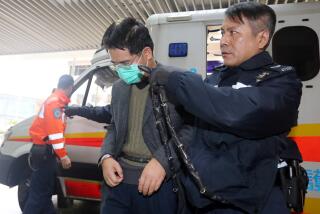Military Trial in Liu Murder Opens; Suspects Trade Charges
TAIPEI, Taiwan — The military trial of three defense ministry intelligence officials implicated in the Daly City murder of Chinese-American journalist Henry Liu opened Thursday with a dramatic confrontation between the gangster charged with carrying out the crime and the admiral he accuses of ordering the murder.
Chen Chi-li, leader of Taiwan’s United Bamboo gang and head of the hit squad charged in the killing, repeated for a military judge allegations that the murder of Liu was ordered by Vice Adm. Wang Hsi-ling, 58, the former military intelligence director. Wang denied it.
Wang, who is charged with instigating the murder, admitted, however, that he casually agreed that Chen should “give a lesson” to Liu.
Vigorous Arguments
Wang and Chen, who appeared without his attorney, argued vigorously--sometimes directly, and sometimes with the judge as an intermediary--over what had transpired between them.
Chen and a fellow gang member have been charged with carrying out the Liu murder and were tried earlier in the week in a civilian court. A verdict in that case is expected to be announced next week.
Liu, a naturalized American who wrote critically of the Taiwan regime in the Chinese language press in the United States, was shot to death in the garage of his home last Oct. 15. His wife, Helen, and others have charged that Liu was killed on orders of the Taiwan government in retaliation for his writings.
The prosecutors, judges, defendants and attorneys in the two trials have focused the proceedings on a debate over whether the gangsters or the military men bear greater responsibility for Liu’s death.
Little new information surfaced in Thursday’s session, however, further frustrating a legal representative of the Liu family who was an observer in court.
Important physical evidence has not been made public, authorities have given no indication that they will call potentially key witnesses such as the police officers who arrested Chen Chi-li, and representatives of Liu’s wife--who were barred from participation in the gangsters’ civilian trial--have no basis in Taiwan’s law to seek to participate in a military trial.
These developments mean that only “the tip of the iceberg” is being revealed in court, charged former law professor Jerome Cohen, who represents Helen Liu.
“It has become very clear today that the only way we’re going to get to the bottom of this is in the objective, written evidence,” said Cohen, former director of East Asian legal studies at Harvard Law School. Cohen cited a notebook or diary kept by Chen Chi-li that police obtained in November as the single most important piece of evidence.
“Where is that?” Cohen said. “Why didn’t they produce that? Will they produce that?”
Cohen said that other written records--including those from 4 1/2 days of Intelligence Bureau training that the government admits Chen Chi-li received two months before Liu’s murder--also should be introduced as evidence.
The case has been handled in such a way that Wang will not face questioning from anyone interested in examining whether higher government officials were involved, Cohen added.
The other two military defendants--Chen Hu-men, 41, and Hu Yi-min, 58, who are charged with assisting in the homicide--acknowledged dealings with Chen Chi-li, including roles in providing him Liu’s photograph and address. But they denied knowledge of any intent by Wang or the gang leader to harm Liu.
The hearing--which was held before a single judge--was concluded without a date being set for the next stage of the trial, which will consist of additional testimony and debate before a five-judge panel.
More to Read
Sign up for Essential California
The most important California stories and recommendations in your inbox every morning.
You may occasionally receive promotional content from the Los Angeles Times.









